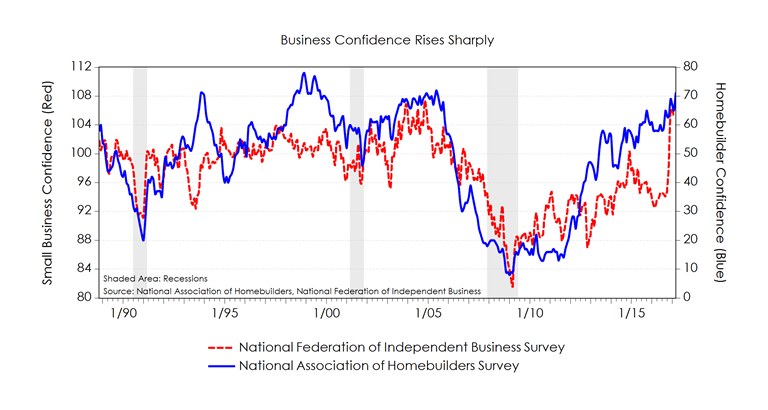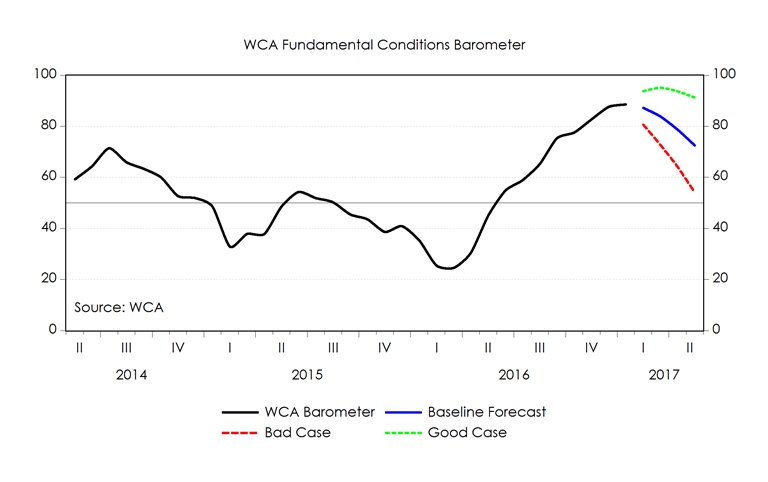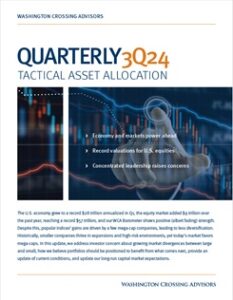Monday Morning Minute 032017
THE WEEK AHEAD
We update our WCA Fundamental Conditions Index this week and forecast a period of moderation ahead.
MACRO VIEW
The Federal Reserve (Fed) delivered their third rate increase since 2015 last week. The increase in the federal funds target rate and rate paid on excess bank reserves was widely expected, however. Months of improving employment and inflation readings paved the way for the hike.
Fed Chair Janet Yellen downplayed concerns over rising asset prices, full employment, and the size of the Fed’s balance sheet. Markets took the tone of the announcement as mostly dovish, or at least consistent with the existing narrative. Stocks initially rose and bonds initially fell following the release, before reversing those moves later in the week. There was little new learned last week that was not already anticipated by markets in other words.
What is new, however, is the data we are getting from businesses. Much overlooked last week were two surveys of business confidence — the NFIB Small Business Survey and the NAHB Homebuilders Survey. Both of these surveys are near cycle highs and the small business survey is much higher than it was in October (chart below).
Increased business confidence mirrors the broader improvement in our WCA Fundamental Conditions Barometer (below). Our recently updated forecast of the barometer envisions some moderation in the months ahead, as we expect the surge in confidence to calm from here. Simply put, the pace of improvement seen in the last few months is welcome, but not sustainable at the current pace. Our forecast path for the WCA Fundamental Conditions Barometer, therefore, envisions a more modest pace near-term growth from here.
If we are right about this forecast, the Federal Reserve may well be justified in maintaining their very slow and cautious approach to policy normalization.
ECONOMIC RELEASES THIS WEEK
| Date | Report | Period | Survey | Prior |
| Monday, Mar 20: | Chicago Fed National Activity Index | Feb | — | -0.05 |
| Tuesday, Mar 21: | Current Account Balance | 4Q2016 | -$129.1B | -$113B |
| Wednesday, Mar 22: | Existing Home Sales M/M | Feb | -1.8% | 3.3% |
| Thursday, Mar 23: | Weekly Jobless Claims | Mar 18 | — | 241K |
| New Home Sales M/M | Feb | 0.9% | 3.7% | |
| Friday, Mar 24: | Durable Goods Orders | Feb | 1.1% | 2.0% |
| Durable Goods Ex Transportation | Feb | 0.5% | 0.0% | |
| Cap Goods Orders Nondef Ex Air | Feb | 0.6% | -0.1% | |
| Cap Goods Ship Nondef Ex Air | Feb | — | -0.4% | |
| PMI Composite Flash | Mar | — | 54.2 | |
| Source: Bloomberg |
ASSET ALLOCATION PORTFOLIO POSTURE
Based on shorter-term expectations, the “tactical” allocation within portfolios is underweight bonds / overweight stocks.
Kevin Caron, CFA, Portfolio Manager
Chad Morganlander, Portfolio Manager
Matthew Battipaglia, Analyst
—————————————————————————————————————————————————–
Disclosures
WCA Fundamental Conditions Barometer Description: We regularly assess changes in fundamental conditions to help guide near-term asset allocation decisions. The analysis incorporates approximately 30 forward-looking indicators in categories ranging from Credit and Capital Markets to U.S. Economic Conditions and Foreign Conditions. From each category of data, we create three diffusion-style sub-indices that measure the trends in the underlying data. Sustained improvement that is spread across a wide variety of observations will produce index readings above 50 (potentially favoring stocks), while readings below 50 would indicate potential deterioration (potentially favoring bonds). The WCA Fundamental Conditions Index combines the three underlying categories into a single summary measure. This measure can be thought of as a “barometer” for changes in fundamental conditions.
The information contained herein has been prepared from sources believed to be reliable but is not guaranteed by us and is not a complete summary or statement of all available data, nor is it considered an offer to buy or sell any securities referred to herein. Opinions expressed are subject to change without notice and do not take into account the particular investment objectives, financial situation, or needs of individual investors. There is no guarantee that the figures or opinions forecasted in this report will be realized or achieved. Employees of Stifel, Nicolaus & Company, Incorporated or its affiliates may, at times, release written or oral commentary, technical analysis, or trading strategies that differ from the opinions expressed within. Past performance is no guarantee of future results. Indices are unmanaged, and you cannot invest directly in an index.
Asset allocation and diversification do not ensure a profit and may not protect against loss. There are special considerations associated with international investing, including the risk of currency fluctuations and political and economic events. Investing in emerging markets may involve greater risk and volatility than investing in more developed countries. Due to their narrow focus, sector-based investments typically exhibit greater volatility. Small company stocks are typically more volatile and carry additional risks, since smaller companies generally are not as well established as larger companies. Property values can fall due to environmental, economic, or other reasons, and changes in interest rates can negatively impact the performance of real estate companies. When investing in bonds, it is important to note that as interest rates rise, bond prices will fall. High-yield bonds have greater credit risk than higher-quality bonds. The risk of loss in trading commodities and futures can be substantial. You should therefore carefully consider whether such trading is suitable for you in light of your financial condition. The high degree of leverage that is often obtainable in commodity trading can work against you as well as for you. The use of leverage can lead to large losses as well as gains.
All investments involve risk, including loss of principal, and there is no guarantee that investment objectives will be met. It is important to review your investment objectives, risk tolerance and liquidity needs before choosing an investment style or manager. Equity investments are subject generally to market, market sector, market liquidity, issuer, and investment style risks, among other factors to varying degrees. Fixed Income investments are subject to market, market liquidity, issuer, investment style, interest rate, credit quality, and call risks, among other factors to varying degrees.
This commentary often expresses opinions about the direction of market, investment sector and other trends. The opinions should not be considered predictions of future results. The information contained in this report is based on sources believed to be reliable, but is not guaranteed and not necessarily complete.
Washington Crossing Advisors LLC is a wholly owned subsidiary and affiliated SEC Registered Investment Adviser of Stifel Financial Corp (NYSE: SF).




